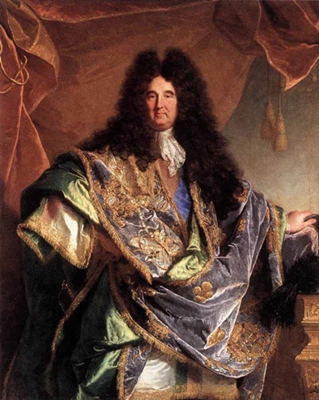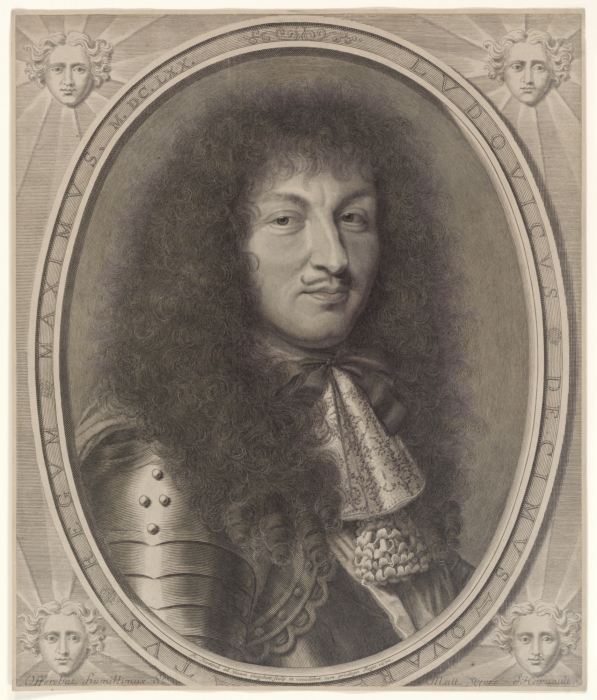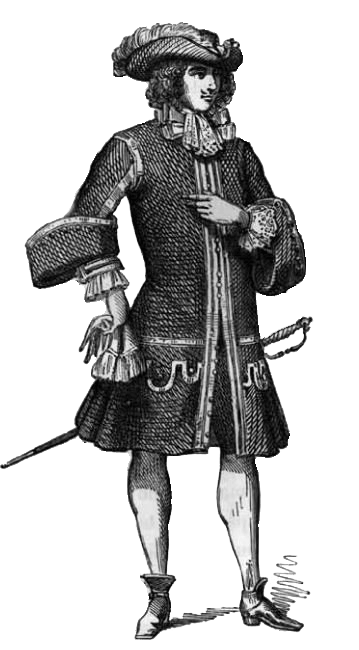Dangeau’s Diary, January 1689

2nd. — The King has appointed Monsieur le Grand to meet the Queen of England, and the Dauphine has appointed me on her behalf. We shall set off the day she sleeps at Beaumont.
5th. — The King received the intelligence, that the King of England arrived yesterday morning at Ambleteuse in good health. His Majesty immediately dispatched one of his gentlemen, to carry the news to the Queen of England, who had reached Beaumont. She was at prayers when Monsieur le Premier arrived to announce the happy tidings, and so completely forgot her misfortunes, that she lifted up her hands and eyes to heaven, saying, ” How happy I am.” An hour before this, we had presented the King’s and the Dauphine’s compliments to her, and, upon our return to her house, found her transported with joy. It is impossible for any one to appreciate, more than she does, the King’s attentions to her and she is extremely satisfied with the reception she has every where met with on her road. The King ordered Monsieur le Premier to set off immediately from Beaumont, in order to meet the King of England. Monsieur and Madame dispatched the same orders to Messieurs Chatillon and de la Rongere, who had been deputed by them to pay their compliments to the Queen.
6th. — The King, after dinner, set off in his coach accompanied by Monseigneur and Messieurs, and proceeded to a place near Chatou, where he waited for the Queen of England, who arrived about a quarter of an hour afterwards. As soon as her carriages approached, the King, Monseigneur, and Monsieur alighted. The King stopped the carriage immediately preceding the Queen’s, in which was the Prince of Wales, whom he embraced. During this, the Queen of England descended from her coach, and complimented the King with expressions full of gratitude, both on her own account, and that of the King, her husband. The King replied, that he was rendering them a melancholy service upon this occasion, but that he hoped the time would come when he could be of more essential use to them. The King had with him his guards, his light horse and his musqueteers, and was accompanied by all his courtiers. The King got into the Queen’s coach, as did also Monseigneur and Monsieur; this had been so arranged the preceding day; it was on this account that she was only accompanied by Lady Powis and Signora Anna Vittoria Montecuculli, an Italian lady, to whom she is very partial. They alighted at the chateau de Saint-Germain, which was magnificently furnished, and where every possible accommodation had been provided for the Prince of Wales. Tourolle, the King’s upholsterer, presented to the Queen the key of a small box, in which were six thousand pistoles. Monsieur and Madame de Monchreveuil, are at Saint-Germain, for the purpose of paying the Queen the compliments of their government. The King of England lies to night at Breteuil. His son, the Duke of Berwick, has preceded him, in order to bring the Queen intelligence of him. The Duchess of Portsmouth wished to present herself to the Queen, but Monsieur de Lauzun informed her, that she would see nobody till after her arrival at Saint-Germain. The reports respecting her observations have not failed to make an impression upon the Queen, but she justified her conduct successfully.
7th. — After dinner, the King heard, for the second time, at Madame de Maintenon’s, the rehearsal of the tragedy of Esther, with the symphony Monseigneur and Monsieur le Prince were there between five and six o’clock. The King entered his coach with Monseigneur and the Duc de Chartres, and alighted at the chateau de Saint-Germain. He found the Queen of England still in bed and he conversed with her about half an hour, and left her when he was informed that the King of England had entered the courtyard. The King went to meet him as far as the door of the guard-room. The King of England bent his knee to him; the King embraced him, and they remained for some time interchanging embraces, and then the King, always giving the right, conducted him to the apartment of the Queen, his consort, and presented him, saying, “I bring you a man whom you will be very happy to see.” The King of England remained a long time in the arms of the Queen, after which, Monseigneur, the Duc de Chartres, the Princes of the Blood, Cardinal Bonzy, and some of the courtiers known to his Majesty, were presented to him by the King. The King then conducted his Majesty of England to the Prince of Wales, and after having reconducted him to the Queen, upon taking leave, said, ” I do not wish you to wait upon me; you are still my guest. Tomorrow, as agreed, you must visit me at Versailles. I will do you the honours, which you must repay me at Saint-Germain, the first time I come there and afterwards we will see each other with out ceremony.”
8th. — The King of England came here about four o’clock. The King went to meet him as far as the end of the guard-chamber, and then conducted him into his apartment, always giving him the right hand. The two Kings conversed a considerable time together, and afterwards entered the cabinet, where they were closetted. The King then conducted the King of England through the gallery to the Dauphine, who was at the door of her apartments, accompanied by all the ladies of the court. Every one stood during the conversation. The King presented the Princesses of the Blood to the King of England and afterwards conducted him to the top of the staircase, which he descended to go to the apartments of the Dauphin, who came to receive him at the door of his guard-chamber, and led him into his apartment, where they conversed a considerable time, standing. They then entered the closet of Monseigneur, whither we followed them. The King of England expressed great admiration at the cabinets, and spoke like a connoisseur of the pictures, porcelain, crystals, and all that he saw. He afterwards went to Monsieur, who was ill in bed, and, having visited Madame, set off at six on his return to Saint-Germain.
9th. — Monseigneur, upon rising from dinner, proceeded to Saint-Germain. The King of England came to receive him at the end of the room, but they did not quit it. They conversed a long time standing, and Monseigneur afterwards went to visit the Queen, who gave him an arm-chair, but below her. On quitting the Queen, Monseigneur visited the Prince of Wales and then returned to Versailles. The King has regulated what allowance he will make the King of England. He will give him fifty thousand crowns as an outfit, and fifty thousand livres a month. The King of England wished only for half these sums. The Queen of England said that she would treat the ladies either according to the etiquette of England or of France. She leaves it to the King’s choice, and will do nothing but what is agreeable to him. The Queen told Monsiegneur that she only waited for a dress, in order to go to Versailles, to pay her court to the King and to visit the Dauphine.
10th. — The King has desired all the Duchesses and ladies to go and pay their court to the Queen of England, who will receive them in the same manner as the Queen our mistress did here. News has arrived from England, that the Prince of Orange has ordered Monsieur Barillon to leave London immediately.
12th. — Some difficulties still existed respecting the ceremonial, upon the manner in which the Princes of the Blood were to be received by their Britannic Majesties. It is at length agreed, that the Princes of the Blood shall be covered when the King is so and that the Queen shall give them folding seats and shall salute them. The late Queen, our mistress, did not permit them to sit down, but they were always seated before the Queen-mother. The late King of England, at Brussels, gave an arm-chair to Monsieur le Prince. The Emperor offered chairs to the Princes de Conti, when they passed through Vienna and there are numerous instances of the Princes of the Blood of France, having received still greater honours, than those paid them on this occasion, but the King is desirous to have more respect shewn to the King of England in his adversity than if he were prosperous. The King of England has created Lord Powis a Duke. He has given up an income of above fifty thousand crowns, in order to follow the King, his master; he is a man of high quality.
13th. — The Queen of England came here about four o’clock. The King went to meet her beyond the guard-chamber, as far as the top of the staircase. They remained for some time in conversation in the salon, where the King dresses himself, the two arm-chairs leaning against the table. The King had no officer behind him. They are always there when his Majesty receives ambassadors, but a difference was observed on this occasion. The King then conducted the Queen through the gallery, as far as the door of the Dauphine’s apartment, who came there to receive her, and led her into her sitting-room. There were six arm-chairs, one for the Queen, one for the Dauphine on the Queen’s right hand, one for the Duc de Bourgogne, one for the Duc de Berri, and, on the left of the Duc d’Anjou and one for Madame. The conversation was very lively, and free from restraint. The Dauphine reconducted the Queen as far as the guard-chamber, and there they took leave, very much gratified with each other. The Queen then went to Monseigneur’s, who had attended as a private individual at the Dauphine’s while the Queen was there. Monseigneur came to receive her at the door of the guard-chamber, and conducted her into the room, where they were both seated for some time, each in an arm-chair. They then entered Monseigneur’s cabinets, with which the Queen was much delighted, and where she expressed great satisfaction at the behaviour of the Dauphine. Monseigneur reconducted her as far as the place where he had met her. From thence the Queen went to Monsieur, who advanced as far as the end of his room in order to meet her. She did not remain there long, but proceeded to Madame’s, who came to meet her at the door of Monsieur’s apartment, and reconducted her to the same place. Monsieur and Madame had arm-chairs the same as the Queen. During all these interviews, Lady Powis, and Signora Montécuculli were seated, Lady Powis as a Duchess, and Signora Montécuculli, as maid of honour to the Queen.
15th. — After dinner, the King, accompanied by Monseigneur, went to Saint-Germain. The King of England came to meet him at the door of the guard- chamber. After having been closetted for some time, they went to the Queen’s apartments, where there were three arm-chairs, but the King of England would not sit down and went near the fire place to speak with Monseigneur who was standing, saying to the King: “We have agreed to wave all ceremony after this visit: I wish to begin from this evening.”
16th. — We learn from Spain, that the King has given the Queen, his consort, forfeitures to the amount of a million. It is supposed she will immediately discharge the debts she has contracted in France, which amount to 200,000 livres. The King of England came here after dinner, and found the King at Madame de Maintenon’s. The King led him into his apartment, shewed him all the little cabinets, and then conducted him to the Dauphine. All ceremony was done away with: Monseigneur wished to wait upon the King of England, but he declined and insisted upon his leaving him at the door of the Dauphine’s apartment. Monsieur de Croissy has received news from England, stating that the Prince of Orange has liberated Lord Feversham. The Lords, assembled at London, propose bringing the King, their master, to trial, upon four capital charges. The death of the King, his brother, to which they assert he was a party; the death of the Earl of Essex, who cut his throat in prison; the supposition of the Prince of Wales; and the treaty of secret alliance with France. It appears, from this expression of malignity, that the King of England has acted wisely in coming to France. There are, however, some noblemen who do not fall into the views of the Prince of Orange, the Earls of Pembroke and Nottingham maintain, that no judiciary process can be undertaken neither against the King nor the Prince of Wales.
17th. — The King of England saw mother Agnes and Madame d’Epernon at the Grand Carmelites. He wished to see mother Agnes, as she was the first person who spoke to him and induced him to change his religion. He performed his devotions at the Jesuits.
20th. — After dinner the King went out shooting and returned about five o’clock, a short time after which the King of England arrived. Their Majesties were closetted for some time and then walked through the chateau. The King of England was desirous of going up stairs to visit Madame de Maintenon, but she came down and saw him in the grand salon.
24th. — A courier has arrived from Rome, and it appears that affairs at that court are far from coming to an amicable adjustment. It is even reported that our ambassador might very likely be recalled. The nuncio has been at Saint-Germain for some days and now returns to Rome, where he hopes to receive a Cardinal’s hat. We are not very well satisfied here, respecting his behaviour in England, and we had rather have him in Italy than in France. The King of England has, by warrant, permitted his son, the Duke of Berwick, to wear the Order of the Garter, although he has not been installed in the chapel at Windsor. When the King of England nominates any one a knight of the Garter, he gives him the riband and the garter, but he does not wear the star till his arms have been placed in the chapel of Windsor, in the place of those of his predecessor and the arms are never placed there till after he has been installed.
26th. — At three o’clock, the King and Monseigneur went to Saint-Cyr, where the tragedy of Esther was represented for the first time and had wonderful success. Madame de Quélus spoke the prologue better than la Champmêlé could have done it. The King, the ladies, and the courtiers, who were admitted, were quite charmed with the performance. Lord Dover and his Lady, Lord Dumbarton, and many Englishmen, have arrived at Calais: They have brought over with them a hundred Irish soldiers. According to report, Lord Dover brings over an immense sum of money. The Prince of Orange has always treated him with particular respect, although he is a catholic, and devoted to the King.
27th. — The King of England came here about four o’clock.The King quitted his cabinet and went to receive him in the salon where he dresses. They conversed for some time near the fireplace and then were closetted in the King’s cabinet, where they remained a long time. The King of England then went to the Dauphine, accompanied by the King, Monseigneur and Monsieur. The Dauphine was not up. They conversed a long time within the balustrade, without sitting down. The King of England then went to Madame de Maintenon and conversed a long time with her. He then visited Monsieur and Madame, before he returned to Saint-Germain. The King has received letters from Bale, informing him, that the Marquis de Villars, returning from Germany, on his arrival by night at Huningen, fell into the ditch of the fortress, put his thigh out of joint and had otherwise severely bruised him self.
30th. — The King and Queen of England came here about four o’clock. The King received them in the room where he dresses and went to meet them as far as his bedroom door. Monseigneur was with the King, Madame la dDuchesse, Madame la Princesse de Conti and Mademoiselle de Blois were also present. They entered the King’s cabinet with the ladies, and a few courtiers. After having seen the small apartment, they proceeded to the gallery and from thence to the Cabinet of Medals, where they took seats. The Queen in an arm-chair near the fire; Monsieur and the Princesses upon folding seats; Madame de Montecuculli upon a folding chair behind the Queen; Monseigneur stood and the two Kings, seated upon folding chairs, were in conference in a corner of the cabinet. At five o’clock they went to the benediction and returned through the grand apartment, which was well lighted up, and entered the apartments of the Dauphine, who was in bed. The two Kings closetted themselves in the little cabinet belonging to the Dauphine, where they continued a considerable time, during which the Queen remained in an arm-chair near the Dauphine; the three children of France were also present.


